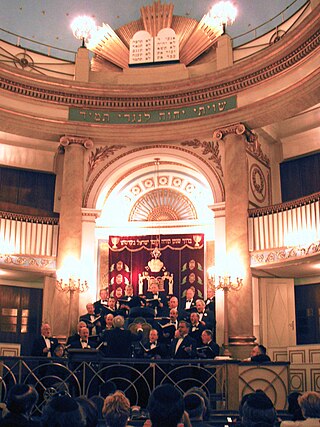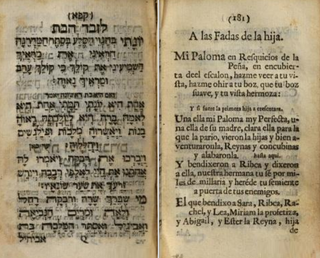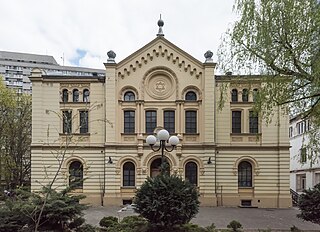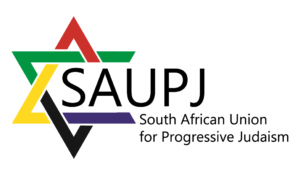
Reform Judaism, also known as Liberal Judaism or Progressive Judaism, is a major Jewish denomination that emphasizes the evolving nature of Judaism, the superiority of its ethical aspects to its ceremonial ones, and belief in a continuous revelation which is closely intertwined with human reason and not limited to the Theophany at Mount Sinai. A highly liberal strand of Judaism, it is characterized by little stress on ritual and personal observance, regarding Jewish law as non-binding and the individual Jew as autonomous, and by a great openness to external influences and progressive values.

Women in Judaism have affected the course of Judaism over millennia. Their role is reflected in the Hebrew Bible, the Oral Law, by custom, and by cultural factors. Although the Hebrew Bible and rabbinic literature present various female role models, religious law treats women in specific ways. According to a 2017 study by the Pew Research Center, women account for 52% of the worldwide Jewish population.

A siddur is a Jewish prayer book containing a set order of daily prayers. The word siddur comes from the Hebrew root ס־ד־ר, meaning 'order.'

A bar mitzvah (masc.), or bat mitzvah (fem.) is a coming of age ritual in Judaism. According to Jewish law, before children reach a certain age, the parents are responsible for their child's actions. Once Jewish children reach that age, they are said to "become" b'nai mitzvah, at which point they begin to be held accountable for their own actions. Traditionally, the father of a bar or bat mitzvah offers thanks to God that he is no longer punished for his child's sins.

A hazzan or chazzan is a Jewish musician or precentor trained in the vocal arts who leads the congregation in songful prayer. In English, this prayer leader is often referred to as a cantor, a term also used in Christianity.
The Union for Reform Judaism (URJ), formerly known as the Union of American Hebrew Congregations (UAHC) until 2003, founded in 1873 by Rabbi Isaac Mayer Wise, is the congregational arm of Reform Judaism in North America. The other two arms established by Rabbi Wise are the Hebrew Union College-Jewish Institute of Religion and the Central Conference of American Rabbis. The current president of the URJ is Rabbi Rick Jacobs.

Zeved habat or Simchat Bat is the Jewish naming ceremony for newborn girls. The details of the celebration varies somewhat by Jewish community and will typically feature the recitation of specific biblical verses and a prayer to announce the name of the newborn child.

Louis Lewandowski was a Polish-Jewish and German-Jewish composer of synagogal music.
Lekha Dodi is a Hebrew-language Jewish liturgical song recited Friday at dusk, usually at sundown, in synagogue to welcome the Sabbath prior to the evening services. It is part of Kabbalat Shabbat.

Reform Judaism, formally the Movement for Reform Judaism (MRJ) and known as Reform Synagogues of Great Britain until 2005, is one of the two World Union for Progressive Judaism–affiliated denominations in the United Kingdom. Reform is relatively traditional in comparison with its smaller counterpart, Liberal Judaism, though it does not regard Jewish law as binding. As of 2010, it was the second-largest Jewish religious group in the United Kingdom, with 19.4% of synagogue-member households. On 17 April 2023, Reform Judaism and Liberal Judaism announced their intention to merge as one single unified progressive Jewish movement. The new movement, which may be called Progressive Judaism, will represent about 30% of British Jewry who are affiliated to synagogues.
The Union of Orthodox Rabbis of the United States and Canada (UOR), often called by its Hebrew name, Agudath Harabonim or (in Ashkenazi Hebrew) Agudas Harabonim ("union of rabbis"), was established in 1901 in the United States and is the oldest organization of Orthodox rabbis in the United States. It had been for many years the principal group for such rabbis, though in recent years it has lost much of its former membership and influence.

The Israel Movement for Reform and Progressive Judaism is the organizational branch of Progressive Judaism in Israel, and a member organization of the World Union for Progressive Judaism. It currently has 40 communities and congregations around the state of Israel, 13 of which are new congregations – referred to as U'faratztah communities – and two kibbutzim, Yahel and Lotan.

The Great Synagogue of Warsaw was a former Orthodox Jewish congregation and synagogue, that was located on Tłomackie street, in Warsaw, in the Masovian Voivodeship of Poland. Designed by Leandro Marconi and completed in the Neoclassical style in 1878, at the time of its opening, it was the largest Jewish house of worship in the world. The grand synagogue served as a house of prayer until World War II when it was destroyed by Nazis on May 16, 1943.

The Nożyk Synagogue is an Orthodox Jewish congregation and synagogue, located at 6 Twarda Street, in the Śródmieście district of Warsaw, in the Masovian Voivodeship of Poland.
Siddur Sim Shalom refers to any siddur in a family of siddurim, Jewish prayerbooks, and related commentaries, published by the Rabbinical Assembly and the United Synagogue of Conservative Judaism.
Temple Beth Israel was a Jewish synagogue located at 840 Highland Road in Sharon, Pennsylvania, in the United States. Originally called House of Israel Congregation, it was founded in 1888 as an Orthodox congregation by Eastern European Jews. The congregation merged with Congregation Rodef Sholom of Youngstown, Ohio in July, 2013; and the former synagogue building was sold to a Christian church in 2014.

The Cytron Synagogue, also known as the Beit Midrash Cytron, is a former Orthodox Jewish congregation and synagogue, located at 24a Ludwika Waryńskiego Street in Białystok, in Podlaskie Voivodeship, Poland. Completed in 1936 in the Modernist style, the construction was funded by Shmuel Cytron, it served as a house of prayer until World War II; subsequently used for profane purposes, and as the Sleńdzińscy Gallery, an art gallery.
The Temple Israel is a Progressive Jewish congregation and synagogue, located in Hillbrow, a suburb of Johannesburg, in the district of Gauteng, South Africa. Designed by Hermann Kallenbach in the Art Deco style, the synagogue was completed in 1936 and is the oldest of eleven Progressive synagogues in South Africa. The synagogue is classified as a provincial heritage site. The congregation is affiliated with the South African Union for Progressive Judaism (SAUPJ), which is part of the World Union for Progressive Judaism (WUPJ).
Beit Emanuel, formally the Temple Emamuel, is a Progressive Jewish congregation and synagogue, located in Parktown, a suburb of Johannesburg, in the district of Gauteng, South Africa. The synagogue was established in 1954 and is one of the largest Progressive Jewish congregations in South Africa. It is an affiliate of the South African Union for Progressive Judaism (SAUPJ), which is part of the World Union for Progressive Judaism (WUPJ).

The South African Union for Progressive Judaism (SAUPJ) is an affiliate of the World Union for Progressive Judaism and supports 11 progressive congregations. Rabbi Moses Cyrus Weiler, a founder of Reform Judaism in the country, led the country's first Reform synagogue, Temple Israel in Hillbrow, Johannesburg. Weiler is credited with growing the movement, to represent 15-17% of South African Jewry and establishing 25 congregations in the country. A 2020 joint study by the Institute for Jewish Policy Research and the University of Cape Town showed that 12% of Jews identified as Progressive and that in relative terms the progressive strands are increasing after falling to 7% in 1998 and 2005 studies. In Johannesburg, the community accounts for 7% of the city's Jewry, rising to 18% in Cape Town and 25% in Durban.















